Prodrive P25 First Drive Review: Your video game fantasy brought to life

BEDFORD, England. It has been a mere three hours since I walked out of London Heathrow following an eight-hour flight from Detroit. The Prodrive P25 I’m sitting in couldn’t possibly be any more unassuming. Finished in a classy and understated blue, it could easily be mistaken for a well-cared-for 1998 WRX owned by some pleasant old enthusiast named Gerald. But under the hood lurks a thoroughly modern — and heavily modified — 2.5-liter (EJ25) boxer-four producing near-as-makes-no-difference 450 horsepower. That’s mated to a six-speed sequential gearbox that sends power to all four wheels via an electronically-controlled center differential. Sure, the 22B STI was underrated at “280” horsepower, but this? This is something else entirely.
The “wah-ba-ba-ba-ba” of the engine bouncing off the limiter ends in a violent snap and a hellish “PWAAAAAAAAAA” as the P25 grabs tarmac and leaps to 60 mph in what feels like a single bound. Cheetah Stance, eat your heart out. This is proper launch control. Prodrive wanted it to happen in 3.5 seconds or less. On their first try, Subaru PR told us, the car did it in 2.8. Not bad, Gerald.
And there’s way more to the P25 than just the engine. Inspired by the WRC97 rally car Prodrive built and campaigned for Subaru in the mid-late 90s, the two-door P25 has virtually zero in common with Gerry’s accountant-spec WRX. The blue paint hides carbon fiber body panels virtually everywhere you look — including through the back window. That’s a mighty big wing.
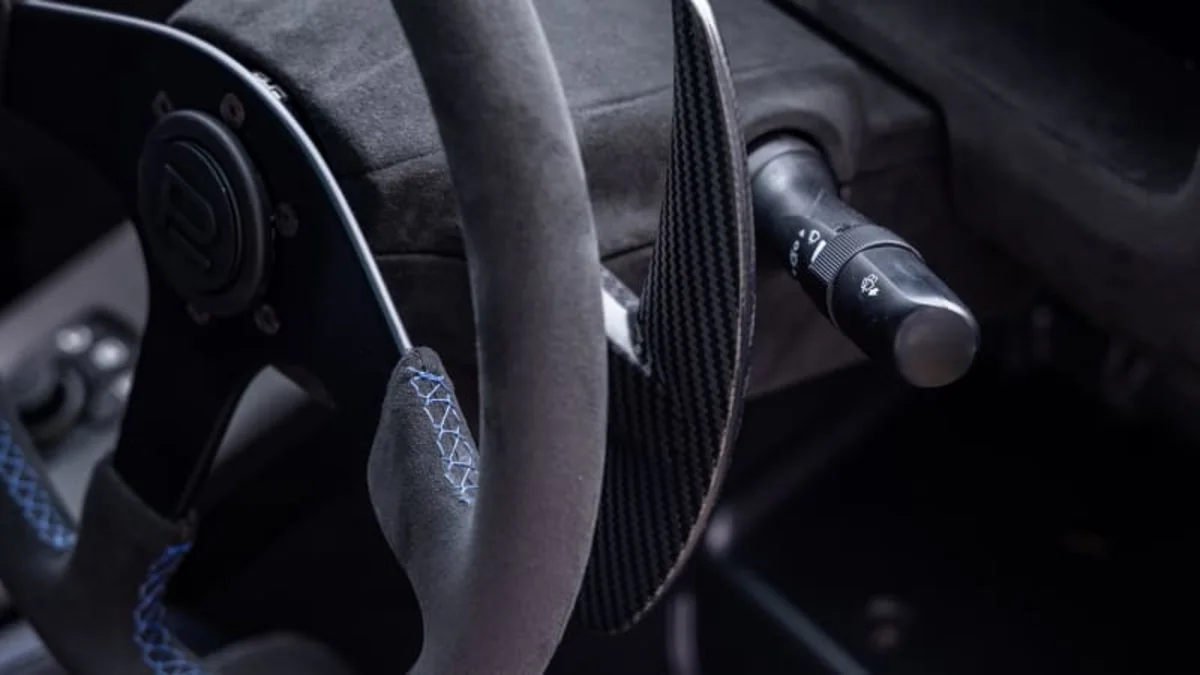
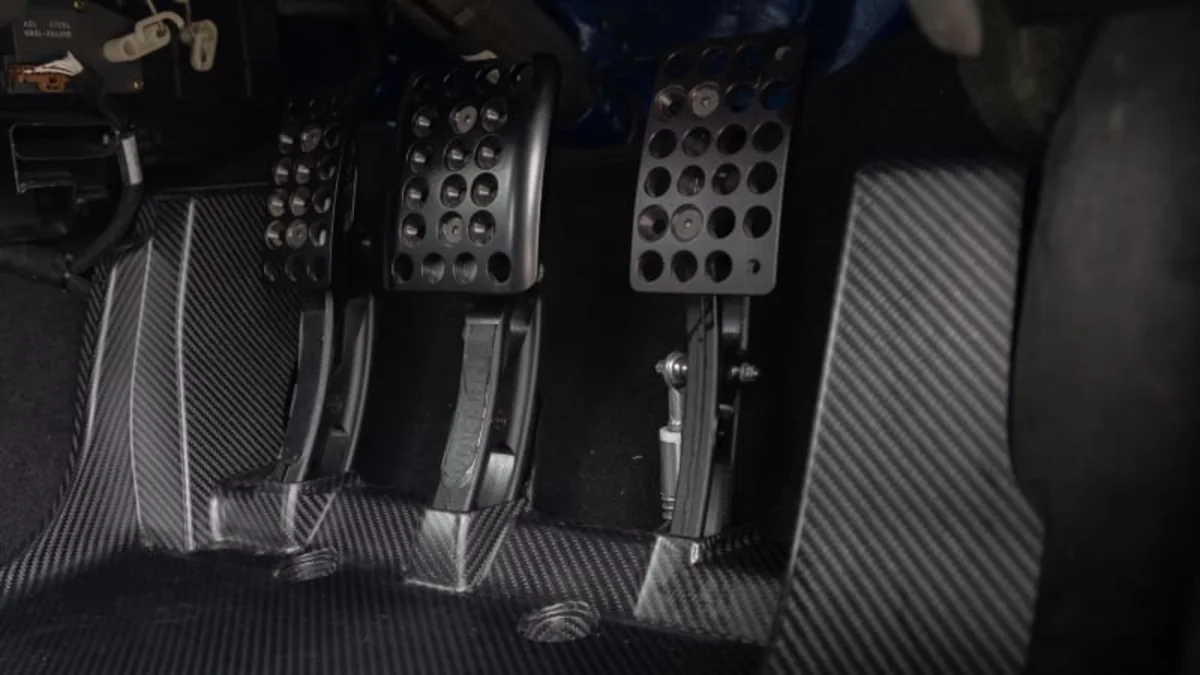
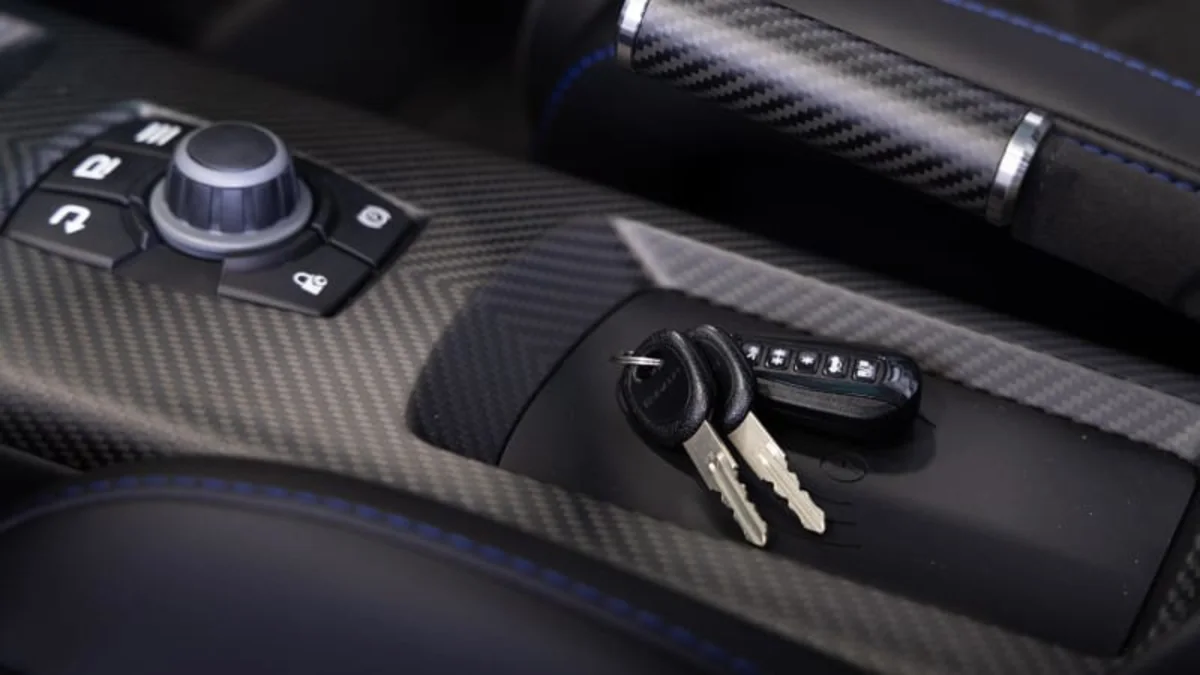
In my sleep-deprived state, piloting the P25 takes some getting used to. Fortunately, the sequential manual eliminates the burden of teaching my muscles to work a left-mounted H-pattern gearbox. It’s a single paddle mounted on the right side of the wheel instead. Pull to upshift; push to downshift. There’s a clutch pedal, but you only need it to stop and start. So much the better; it’s electrically activated and has about as much feedback as an iPhone screen.
Speaking of modern electronics, it’s got those too, but just the ones you want. There’s a built-in anti-lag system to keep your turbo spooling even when you’re off the throttle, and an active titanium exhaust system from Akrapovic so you can dial things back a bit when you return home from the track. After all, if you were (past tense; all 25 are sold out) in a position to shell out nearly half a million dollars for a retro-themed Subaru, your neighbors are probably the type who don’t want to hear it. The cluster’s digital and the diagnostic system is modern too — a wild juxtaposition to the original, 1998-spec key fob. The future is sick.
There are even drive modes, though you won’t find “eco” or “snow” among them. There are only three: Road, Sport and Sport Plus. “Road” dials the power back to a more-civilized 350-ish horsepower — all you need for a grocery run, really. “Sport” unleashes the remaining hundred, and “Sport Plus” enables the anti-lag and bypasses the exhaust silencer. Oh, yes, it’s all as silly as it sounds — and in the absolute best way.
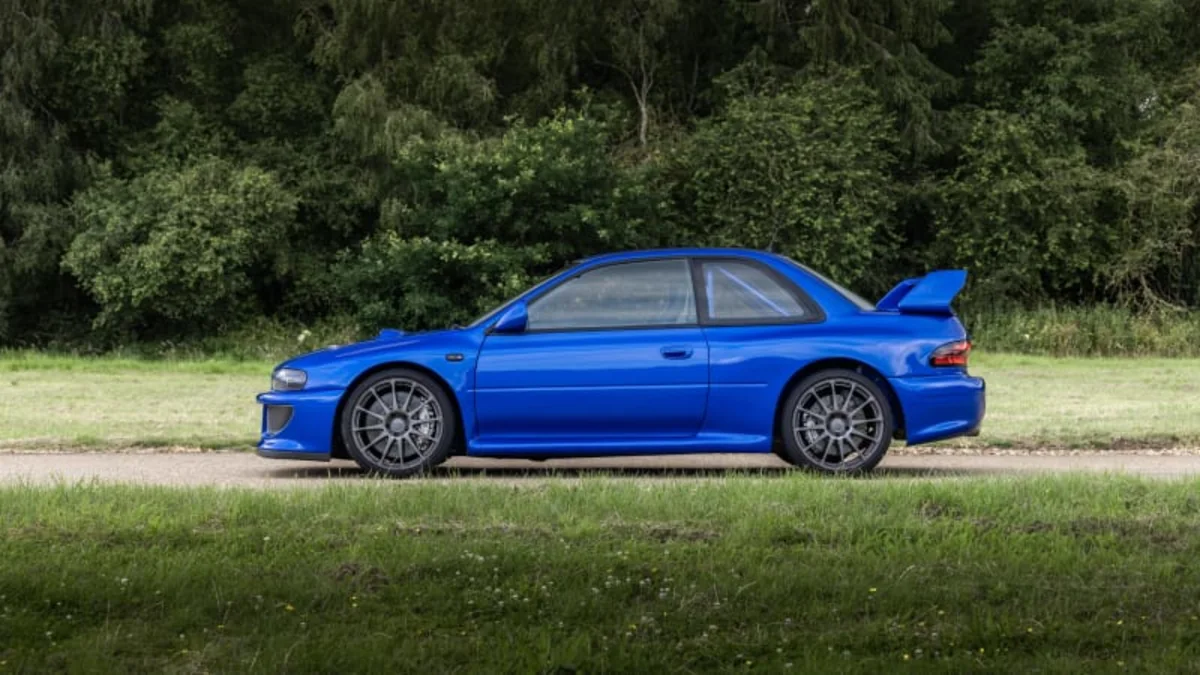
My Prodrive handler set me off in “Road” first to allow me to get acquainted with this brutish little machine. And truly, it’s quite pleasant for what it is. The fully adjustable Bilstein suspension soaked up the horrific surface of Millbrook’s short test track with aplomb and left me thirsty for the rest of that power. With the switch flipped and the hammer down, the little track’s front straight disappears by the time you’ve caught your breath.
This narrow, tight circuit is made from worn concrete, and there’s a sharp drop-off to the grass at its edge. Curbs? What curbs? Drop a wheel on the inside of a corner and at best, you’ll snap your teeth closed coming back on. Go much further off, and you’re probably wrecking a wheel and tire. Worst case? Airborne, and probably with some steering dialed in. No big deal, right? It’s a rally car, after all.
But I’m conscious of all that as I’m forcing my jetlagged vision to accept the notion of driving from the wrong damned side. This track feels like it’s a car length wide at most, and while it’s likely closer to 25 feet, the unforgiving edges demand a respectful cushion, but the huge (6-piston front, 4-piston rear) AP Racing brakes grab like mad and don’t let go. It’s almost like this car won’t let you fail, and it’s impossible to resist the wail of that overachieving boxer engine, even knowing that a momentary lapse in judgment could jeopardize a half-million-dollar car. Yes, really.
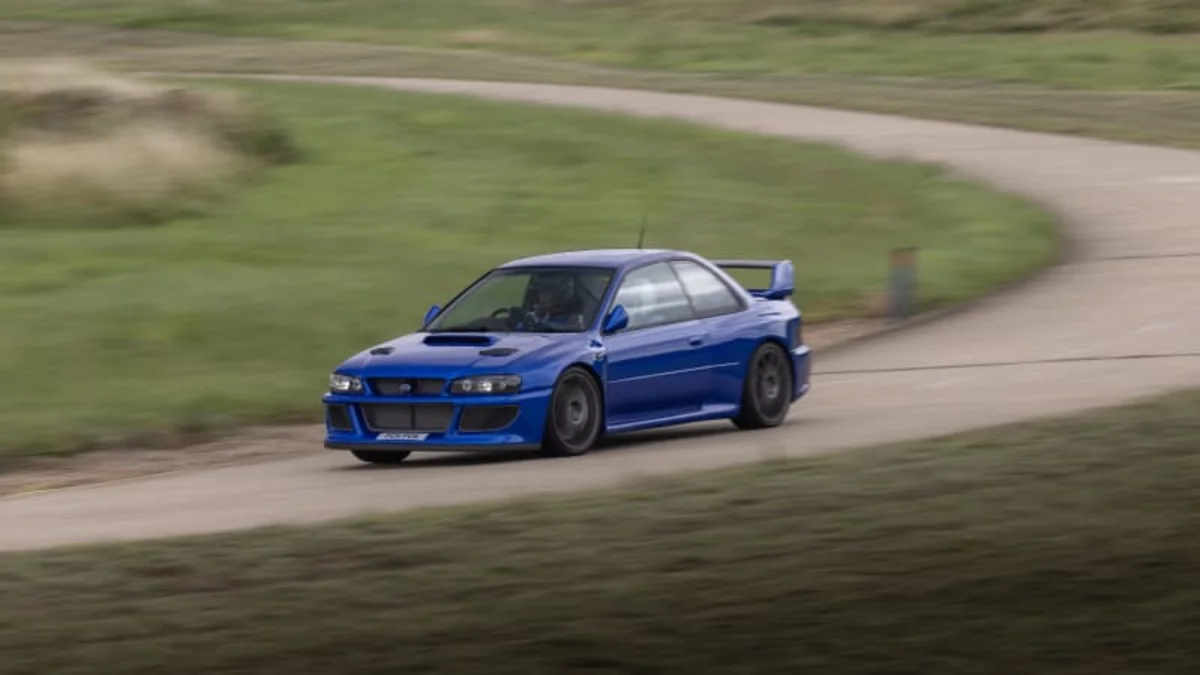
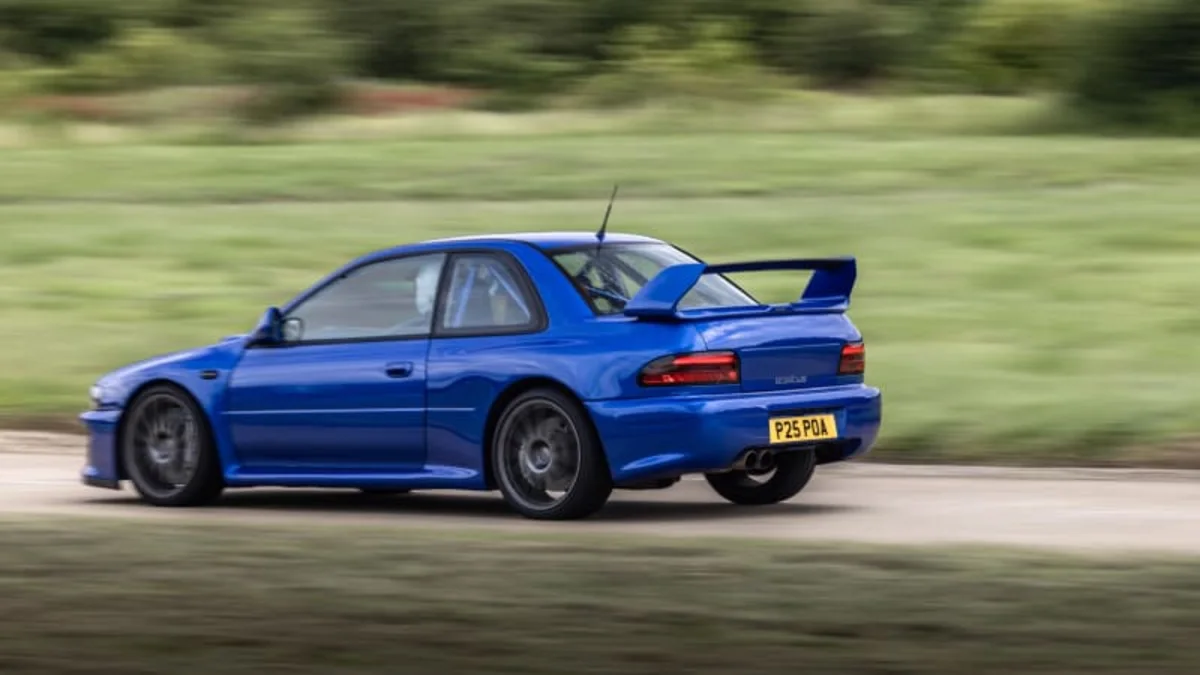
But man. This. Thing. Rips. As well it should. With all that carbon fiber (roof, trunk, door mirrors, hood, wing and fenders), it weighs less than 2,500 pounds. Our test model came with road-friendly sport seats and standard three-point belts, but two carbon fiber seats can also be optioned, each with a matching set of race harnesses. But for all of that weight savings, the P25 still comes with a spare tire and quick jack.
If this all sounds to you like the fever dream (come true) of a millennial car forum kid circa 2006, you’re not wrong. If there’s a bullseye for marketing a product like this, I’m certainly adjacent to it at minimum. But to better understand it, let’s zoom out a bit. I turn 39 this week. I entered the car world when our parents were madly overspending on ‘50s and ‘60s nostalgia. I’ve seen it from that side; now it’s my turn.
I passed many a late college night with Barrett-Jackson hosts fawning in the background over numbers-matching muscle cars and gaudy hulks with enough fins to be mistaken for some long-extinct leviathan. Like many of my generation, I couldn’t wrap my head around the rapid price inflation of rock n’ roll rust rockets. If you’re Gen X or an older millennial, best limber up if you plan to dodge the growing onslaught of nostalgia-fueled bank account bait. The P25 is just the tip of the iceberg.
Related video:



